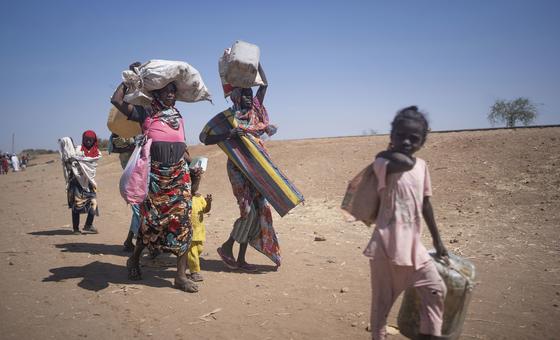This is being compounded by an increase in child and forced marriage, and the recruitment of boys by combatants in the continuing war between rival generals that erupted nearly a year ago.
All this is happening against the backdrop of the deteriorating humanitarian crisis in the country that has caused an unprecedented mass displacement of over nine million people.
Access to support for victims and survivors has reportedly deteriorated since December, eight months after the outbreak of conflict between Rapid Support Forces (RSF) and the Sudanese Armed Forces (SAF), the Human Rights Council-appointed experts said.
Girls sold at ‘slave markets’
Young women and girls, including internally displaced persons, are reportedly being trafficked, they said.
“We are appalled by reports of women and girls being sold at slave markets in areas controlled by RSF forces and other armed groups, including in North Darfur,” the experts said.
Some of the cases of child and forced marriage are occurring due to family separation and gender-based violence, including rape and unwanted pregnancies.
“Despite previous warnings to both Sudanese authorities and RSF representatives, we continue to receive reports of recruitment of children to actively participate in hostilities, including from a neighbouring country,” the experts said.
“The recruitment of children by armed groups for any form of exploitation – including in combat roles – is a gross violation of human rights, a serious crime and a violation of international humanitarian law,” they said.
Special Rapporteurs and other independent experts are not UN staff and are independent of any government or organization. They serve in their individual capacity and receive no salary for their work.
Mass grave found in Libya highlights migrant horrors
A mass grave has been found in southwest Libya containing at least 65 migrants who are believed to have died while being smuggled through the desert.
According to the UN migration agency (IOM), which sounded the alarm on Friday, increasing numbers of people are dying on dangerous routes to northern Africa and beyond.
Without legal pathways for migrants, “such tragedies will continue to be a feature along this route,” the agency warned.
Questions remain
The circumstances are not clear surrounding the deaths of those found in the mass grave and their nationalities are also unknown.
Libyan authorities had launched an inquiry, IOM said, urging the “dignified recovery, identification and transfer of the remains of the deceased migrants” and for their families to be notified.
According to the UN agency’s Missing Migrants Project, at least 3,129 people died or disappeared in 2023 along the so-called “Mediterranean route”.
Even before the discovery of the mass grave, it was already the deadliest migratory route in the world.
Massive rise in displacement in DR Congo poses dire threat to children
A major upsurge in violence in eastern Democratic Republic of the Congo that has displaced at least 400,000 people in North Kivu since the beginning of the year is exposing children to unacceptable levels of violence, said the UN Children’s Fund (UNICEF) on Friday.

People displaced by conflict are living in a temporary camp near Goma in the eastern Democratic Republic of the Congo.
At-risk children must receive further protection to avoid more deaths, the agency added.
In the latest incident on Wednesday highlighting the spillover of the conflict into South Kivu province, an explosion in the town of Minova seriously injured four children who required hospital treatment.
Schoolchildren bombed
“It is tragic that at a busy time of day when many children were returning home from school, this explosion from a bomb maimed four innocent children,” said Katya Marino, UNICEF Deputy Representative to the Democratic Republic of the Congo. “The town is already under incredible strain with massive numbers of new arrivals of internally displaced people.”
More than 95,000 newly displaced people, half of whom are children, arrived in Minova in February as the conflict in North Kivu expanded.
Over the past week, UNICEF and local partners distributed essential household supplies in Minova to more than 8,300 newly displaced families. The area is now increasingly difficult to access with assistance, either by road or boat.
UNICEF has been assisting children affected by the conflict there with a package of basic but essential services since 2023 while supporting community-based networks to refer and protect children caught up in the fighting between numerous rebel groups and government forces.

